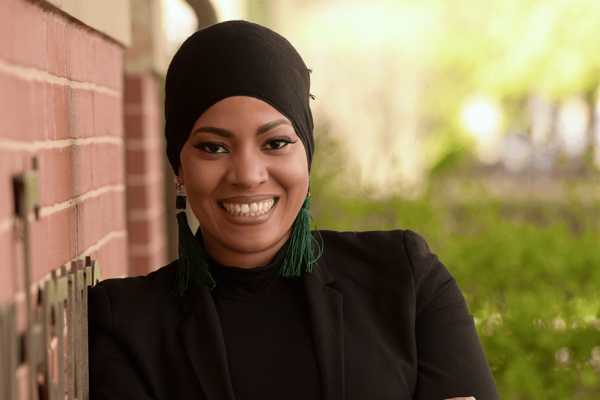Tania Fernandes Anderson, Boston’s newly elected councilor, embraces struggle.
In November, she made history as Boston’s first Muslim, first African immigrant, and first formerly undocumented person to be elected to the city council. Now, with an ambitious slate of policy goals, she hopes to transform the city she calls home. While politics brings a new set of challenges for Anderson, her struggle doesn’t take place at city hall. Rather, her struggle is spiritual.
In Arabic, jihad describes a spiritual battle for holiness that serves as the bedrock of Islamic faith; while Westerners falsely conflate jihad with Islamic terrorism, it’s the word Anderson associates with her work.
“The word jihad, it means to struggle or strive or sacrifice. I am struggling, I am striving to become that person to save my own soul — to be kind, to be neighborly, to be fair, to be patient,” Anderson told Sojourners. “I’m struggling to understand policies that impact the community at large but that are equitable, that are just.”
From Cape Verde to Boston
Anderson was born in the African island nation of Cape Verde and arrived in Boston in 1989 at the age of 10. Her mother had come to the United States six years earlier, leaving her and her siblings under the care of her uncle.
“I just remember [my uncle] saying to me: ‘Don’t forget your brothers and sisters,’” Anderson told Sojourners. “‘When you get there, you get a job as soon as you can, and you help your mom, you keep her on track, so she can send for your siblings.’ And I think I took that to heart.”
At 13, she won a scholastic writing competition that led to a job as a peer leader at a local community center. The same year, the undocumented teen paid $50 for a fake Social Security card so she could collect her paychecks.
Anderson, who was working multiple jobs through high school, said she could barely keep her eyes open in class or make passing grades. A sympathetic teacher was able to help Anderson avoid expulsion, and after repeating a year, she received her diploma.
In 1998, Anderson was 19 years old and pregnant with her first son. She couldn’t go to college without a green card. Her family was still struggling to pay bills and were eventually evicted from the Academy Homes housing development. Anderson was unhoused for three weeks before seeking help from a shelter that offered subsidized housing to undocumented people. She continued to support her mother and younger siblings, as well as her new child.
“I’m graduating from high school feeling like I don’t have a life, I don’t have a future, what’s the point,” Anderson said.
But Anderson pressed into the struggle, and in the next two decades, worked as a program manager at a women’s shelter, a social worker, HIV-prevention counselor, a parent advocate with the Boston Public Schools, and founded both a mental health nonprofit and theater company for at-risk youth. In 2019, she became a citizen. It was a lengthy process that involved fighting in immigration court to avoid deportation and securing her permanent resident card, but Anderson was eventually allowed to naturalize three decades after she first set foot in Boston.
Interest in politics
Anderson’s interest in politics was first piqued during the pandemic, when she was chosen to direct Bowdoin Geneva Main Streets, a local nonprofit focused on assisting small businesses.
There, Anderson’s future political agenda crystalized. Her experiences in social services and business development led her to believe that economic independence is the antidote to issues like substance abuse, health inequality, and disenfranchisement.
“I started connecting social determinants of health with systemic racism and lack of economic integration for Blacks and people of color in Boston,” she said.
She also saw politics up close for the first time, learning how to surmount bureaucratic obstacles to deal with issues like zoning.
“I knew nothing, nothing, nothing about politics, but I had to learn on the fly,” she said.
At the urging of her cousin, former Massachusetts State Rep. Evandro Carvalho, and other community members, Anderson decided to run for city council and signed up for a program with Emerge Massachusetts, a nonprofit that trains Democratic women to run for office. After growing up in what she called Boston’s “projects” and seeing the tolls of systemic racism and lacking support for minority students and workers, Anderson felt she was uniquely positioned to change her city for the better.
A member of Boston’s Muslim community connected Anderson with Mohammed Missouri, the executive director of Jetpac, a nonprofit that seeks to elect American Muslims through grassroots campaigns.
Missouri would prove instrumental to her campaign, but he said Anderson didn’t need the type of support that other first-time candidates often require, like learning to speak before an audience. Constituents quickly responded to her down-to-earth presence and empathetic posture. “She makes people feel heard because she’s actually listening,” said Missouri.
In the primary, she faced off against Roy Ownes Sr., a regular candidate for local office in Boston, who lobbed Islamophobic taunts at her and accused her of spreading Sharia law. His comments were just the latest in a string of Islamophobic and racist insults Anderson had received throughout her life.
Anderson endured the post-9/11 years, when there was a historic spike in violence against Muslims, and then its next surge during then-President Donald Trump’s campaign and presidency.
“At first, it was really scary, but when you believe in something and you know that you love your religion … then you’re not fearful of the repercussions,” she said. “We’re taught to understand and be compassionate. And that is the best weapon against ignorance.”
While she prays five times a day and reads and studies the Quran, Anderson said she largely practices her faith by embodying gratitude, charity, and a commitment to being her best self for her community.
Legislative goals
At the top of Anderson’s legislative goals is equipping small business owners with the tools they need to thrive. It’s a priority close to her heart, considering Anderson taught herself to sew and opened her own clothing store in Boston. That led to another entrepreneurial project — Noah’s Advocate — where she merged fashion and theater to create art productions starring at-risk youth.
Anderson wants to provide loans and grants to minority business owners, expand access to financial literacy courses, and repurpose vacant city lots so businesses can reach their communities more easily.
She imagines those lots could also be used to sell local fruits and vegetables, by investing in urban farm programs. It’s part of her vision to make Boston greener, including planting more trees around the city.
One issue that repeatedly cropped up throughout Boston’s municipal election was the issue of “Methadone Mile.” The disparaging name refers to a concentration of methadone clinics where unhoused people, drug dealers, and people seeking treatment for their substance use disorder intersect.
Informed by her work as an HIV-prevention counselor, where she saw the positive benefits of harm reduction efforts like needle exchanges, Anderson wants to disperse the clinics throughout the city to create “manageable pockets of treatment,” while doubling down on harm reduction programs like assisted housing and counseling.
She also hopes to accomplish the creation of a youth center in Roxbury, one of the neighborhoods Anderson represents. By focusing on youth education and training, Anderson hopes to address Boston’s drug use, housing instability, and crime, all through what she describes as a reimagined “21st century public safety policy.”
It’s an ambitious agenda, but those who know Anderson personally have no doubt in her follow-through.
“When a door is closed, Tania’s going to go around, she’s going to see if she can find a ladder, climb up on top of the roof and go down the chimney,” Shalom Elohim, Anderson’s best friend from high school, told Sojourners.
As for the newly elected councilor, she knows a long road lies ahead, but Anderson has a tried-and-true strategy which she has no intention of altering.
“I have a big list,” Anderson said. “But I’ll start at the tip and just chip away one day at a time.”
Got something to say about what you're reading? We value your feedback!








